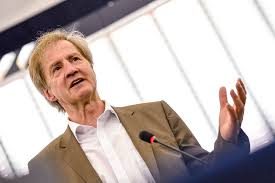
EU Observer (16 July 2018)
With the US, its closest ally, treating it as a threat to national security, the EU is looking more and more to China to maintain a rules-based world order.
In Beijing on Monday (16 July), the EU and China committed to conclude as quickly as possible a bilateral agreement on investmen.
"China is a strategic partner," Jo Leinen, the chairman of the European Parliament delegation for relations with China, told EUobserver.
But within this evolving partnership, "we have to define more concretely where we have a strategic interest and where we have conflict," he said in an interview ahead of the summit.
"We should not be too naive and comfortable in our approach with China," he insisted.
Leinen, a Social Democratic MEP from Germany, noted that Europeans and Chinese have a common interest in implementing the Paris climate agreement from which US president Donald Trump pulled out, as well as on security issues.
But the MEP pointed out "growing frictions" on economic issues, which are "at the heart of EU-China relations."
"China is not a market economy, there is not a fair competition between Chinese and European companies," he said.
He insisted that "Europe has to be prepared for [a] challenge and look for reciprocity."
"Chinese companies have an open market, European companies should have normal access to the Chinese market," he argued.
"If Chinese researchers take part in the Horizon 2020 programme, European companies should have non-discriminatory access to Chinese research programmes. If Chinese companies can use free internet in Europe, European companies should have the possibility to use the internet freely in China."
"There is a Chinese egoism that we cannot overlook," he added, referring to China's selective observance of the rules of the World Trade Organization - "step by step when it suits them, and under pressure."
'Reminder - human rights are universal'
Leinen insisted however that talking to China was "the right approach", compared to Trump's "very destructive way" to address problems such as overcapacities or state-subsidies.
"The main challenge for them is the US," he noted.
"They like to have Europe as a partner against the US, that's clear on trade, and more and more on peace and security," he argued. "They see Europe as a global player that could mediate between them and the US and that could be ally against threats and challenges from the US."
From his role as EU parliament pointman, Leinen insisted that freedom and values were also a central issue in relations with China.
"We have to remind them that human rights are universal," he said.
There is a conflict [on the human rights issue] that is growing because repression is growing after the last party congress," he added.
The MEP, who said he has been interested in China since his student days but was never a Maoist, noted that "communism dominates the whole society," especially since the 'Xi Jinping Thought' - named after the current Chinese leader - was introduced as a new official doctrine last year.
He argued that the doctrine, which states the Communist Party's "absolute leadership" and combines economic liberalism with social control, "creates mistrust."
No role model
In the current global "competition of models of society", Leinen admitted that China was "of course a role model for illiberal democrats, like Turkey's Erdogan, Russia's Putin or Hungary's Orban."
He argued however that "China will probably lose [because] they do not offer a model of society that is attractive."
"They are successful on economic development but they are not successful in political development," he argued.
China, which is already the second world economy behind the US, "will be number one in the world, in 20-30 years," Leinen observed.
In that process, a crucial question will be what it can do with its power.
"Is China the peaceful country that they are claiming or will they use their power to dominate their neighbourhood and whoever they can dominate?" the MEP asked.
"It can be a danger for Europe, as well as a partner to develop the world and to keep stability in the world," he said.
But for now, "this is something that is unclear."
No comments yet.
- EU IS 'FOE', AS TRUMP SEEKS TO BEFRIEND PUTIN Europe - EU 16.07.2018
- EU SAYS CHINA COULD OPEN ITS ECONOMY IF IT WISHES Europe - EU 16.07.2018
- UKRAINIANS NERVOUS TRUMP, PUTIN COULD DECIDE ON CRIMEA QUESTION Europe - EU 16.07.2018
- IRAQI PRIME MINISTER MAKES 7 DECISIONS TO MEET DEMANDS OF PROTESTERS - REPORTS Iraq 16.07.2018
- SLOVENIA TO HOLD LOCAL ELECTIONS ON NOVEMBER 18 The Balkans 16.07.2018
-
19.04.2024
Türk-Ermeni İlişkileri Üzerine Ömer Engin Lütem Konferansları 2023 -
11.04.2023
Türk-Ermeni İlişkileri Üzerine Ömer Engin Lütem Konferansları 2022 -
27.03.2023
RADİKAL ERMENİ UNSURLARCA GERÇEKLEŞTİRİLEN MEZALİMLER VE VANDALİZM -
17.03.2023
PATRIOTISM PERVERTED -
23.02.2023
MEN ARE LIKE THAT -
03.02.2023
BAKÜ-TİFLİS-CEYHAN BORU HATTININ YAŞANAN TARİHİ -
16.12.2022
INTERNATIONAL SCHOLARS ON THE EVENTS OF 1915 -
07.12.2022
FAKE PHOTOS AND THE ARMENIAN PROPAGANDA -
07.12.2022
ERMENİ PROPAGANDASI VE SAHTE RESİMLER -
30.03.2022
Türk-Ermeni İlişkileri Üzerine Ömer Engin Lütem Konferansları 2021 -
01.01.2022
A Letter From Japan - Strategically Mum: The Silence of the Armenians -
01.01.2022
Japonya'dan Bir Mektup - Stratejik Suskunluk: Ermenilerin Sessizliği -
11.02.2021
Türk-Ermeni Uyuşmazlığı Üzerine Ömer Engin Lütem Konferansları 2020 -
03.06.2020
Anastas Mikoyan: Confessions of an Armenian Bolshevik -
08.04.2020
Sovyet Sonrası Ukrayna’da Devlet, Toplum ve Siyaset - Değişen Dinamikler, Dönüşen Kimlikler -
18.03.2020
Türk-Ermeni Uyuşmazlığı Üzerine Ömer Engin Lütem Konferansları 2019 -
08.03.2019
Türk-Ermeni Uyuşmazlığı Üzerine Ömer Engin Lütem Konferansları 2018 -
12.06.2018
Ermeni Sorunuyla İlgili İngiliz Belgeleri (1912-1923) - British Documents on Armenian Question (1912-1923) -
02.12.2016
Turkish-Russian Academics: A Historical Study on the Caucasus -
01.07.2016
Gürcistan'daki Müslüman Topluluklar: Azınlık Hakları, Kimlik, Siyaset -
10.03.2016
Armenian Diaspora: Diaspora, State and the Imagination of the Republic of Armenia -
24.01.2016
Ermeni Sorunu Temel Bilgi ve Belgeler (2. Baskı)
-
AVİM Conference Hall 24.01.2023
CONFERENCE TITLED “HUNGARY’S PERSPECTIVES ON THE TURKIC WORLD"









